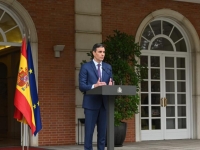Politics
Sánchez advances the legislatives to July 23 after the socialist debacle
In the local and regional elections
USPA NEWS -
The President of the Spanish Government, Pedro Sánchez, announced on Monday the holding of legislative elections on July 23. After the socialist debacle in the local and regional elections held on Sunday May 28, the Spanish Prime Minister decided to advance the legislative elections in an attempt to stop the flight of socialist votes to other political options. In a public appearance, Sánchez assured that he "assumes" responsibility for what happened in the local and regional elections.
The electoral appointment of May 28 certified the debacle of the Socialist Party, which lost five regional governments, failed to avoid the absolute majority of the conservative Popular Party in Madrid, lost six of the eight major Spanish capitals: Madrid, Seville, Valencia, Málaga, Murcia and Zaragoza, and lost 400,000 votes. Something that hardly anyone expected and that occurred at the end of the first Socialist legislature, when under normal conditions there has not been time for the Government to wear down. But Sánchez will go down in history as the most deceitful politician in democracy and the one most obsessed with staying in power. He said that he would not sleep peacefully if he had to agree with the extreme left represented in Podemos and formed a coalition government with them; he said that he would never give in to independentists and terrorists, and he has relied on them to hold office. Now, the May 28 plebiscite leaves a hegemonically conservative Spain and a Socialist Party touched on its waterline.
With this panorama, the Prime Minister only had one option left: advance the legislative elections, initially scheduled for the month of November, to July 23, within 55 days. "The best thing is that the Spanish take the floor and pronounce themselves," said Pedro Sánchez in his public appearance this Monday. In the afternoon a Cabinet meeting will be held and the official newspaper will publish this Tuesday the dissolution of Parliament and the call for early elections.
“The direction of the vote [in local and regional elections] conveyed a message that goes further and that is why I assume the results; we submit the mandate to the popular will,” he added this Monday. And the conservative leader, Alberto Núñez Feijoo, picked up the gauntlet: “I ask from now on a clear, incontestable and forceful majority to start a new direction. We must leave behind five years to forget. Five years of values that are not typical of our society. Five years of the PSOE government with Podemos, with Bildu and the independentists are too many. The first step was taken yesterday,” he said and added: “Sanchismo has not been repealed yet. I ask for an uncontested majority.”
“A little over a year ago I obtained the confidence of my party to be its president. Today I ask for the confidence of the citizens to be the next president of the Government of Spain," explained Alberto Núñez Feijoo.
According to various experts, the announcement of the call for early elections for July 23 is "a coup d'état" by the Prime Minister, Pedro Sánchez. In his opinion, Sánchez "goes for everything or nothing," trying to stop the flight of Socialist votes. And from Madrid, President Isabel Díaz Ayuso believes that Sánchez "has given up." After obtaining an absolute majority, Díaz Ayuso pointed out that "in Spain there were 8,000 motions of censure yesterday" against Sánchez.
Meanwhile, the stock market's reaction was swift and the selective Ibex-35 index fell from the start of the day, 'eating' all the gains made in previous days. At 4:00 pm. the losses were 0.43 percent. The markets ask for stability, something that they do not find in the electoral advance announced by Pedro Sánchez.
Liability for this article lies with the author, who also holds the copyright. Editorial content from USPA may be quoted on other websites as long as the quote comprises no more than 5% of the entire text, is marked as such and the source is named (via hyperlink).






